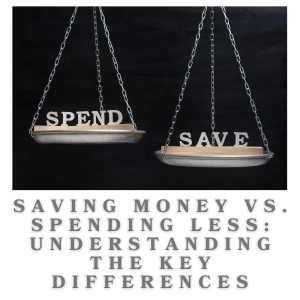When it comes to managing your finances, two concepts often arise: saving money and spending less. While they might sound similar, they represent different approaches to handling your finances. Understanding the difference between these two can help you make better financial decisions and, ultimately, build a more secure financial future.

Let’s dive into each concept and explore how they differ.
What Does Saving Money Mean?
Saving money refers to the practice of setting aside a portion of your income for future use. The goal is to accumulate funds for emergencies, investments, retirement, or big purchases. Saving is usually done in a safe place like a savings account, an investment vehicle, or even in cash.
Here are a few key points that define saving money:
- Active Effort: Saving money often requires an active effort and habit. This includes putting aside a certain amount of money each paycheck or periodically transferring funds to a savings account.
- Future-Focused: Saving is inherently future-focused. The goal is to have money available for an event that might be weeks, months, or even years down the line.
- Building a Safety Net: Saving money helps build a financial cushion for emergencies (such as medical bills or car repairs) and long-term goals (such as buying a house or retirement).
- Investments: Often, saving doesn’t mean just stashing cash; it can also mean putting money into low-risk investment options, like mutual funds, stocks, or bonds, to help grow your wealth over time.
What Does Spending Less Mean?
Spending less is all about reducing your expenses and living within (or below) your means. It involves making conscious choices to cut back on discretionary purchases, finding ways to lower fixed expenses, and being more mindful of your spending habits.
Here are some points that define spending less:
- Reduced Consumption: When you focus on spending less, you’re not necessarily saving money but cutting out unnecessary purchases. It’s about being more frugal and minimizing excess.
- Mindful Choices: The goal is to make deliberate, thoughtful decisions about where and how you spend. Whether it’s eating out less, downgrading subscriptions, or avoiding impulse buys, the objective is to decrease your overall spending.
- Budgeting and Control: Spending less requires actively managing your budget and tracking where your money goes. It’s about gaining control over spending habits and ensuring you’re not living beyond your means.
- Not Always Future-Oriented: While saving is future-focused, spending less is typically focused on the present. It’s about making small daily choices that add up over time, with an immediate benefit of more cash in hand.
Key Differences Between Saving Money and Spending Less
- Purpose and Focus:
- Saving money is about building up financial reserves for the future, whether for emergencies or big life goals.
- Spending less focuses on cutting current expenses to make more room in your budget today.
- Approach:
- Saving often involves actively putting money away into savings or investments, growing your wealth over time.
- Spending less involves finding ways to reduce or eliminate spending on non-essential items.
- Long-Term vs. Short-Term:
- Saving is generally a long-term endeavor, with goals like retirement, buying a house, or building an emergency fund in mind.
- Spending less provides short-term benefits of having more disposable income, but it doesn’t necessarily contribute to long-term wealth building unless combined with saving.
- Impact on Lifestyle:
- Saving money typically doesn’t require significant lifestyle changes—it’s more about being disciplined and prioritizing savings.
- Spending less may involve lifestyle changes, like cutting back on luxuries, altering your spending habits, and rethinking daily routines.
How to Make Both Work Together
While saving money and spending less are distinct concepts, they can work together to achieve better financial health. In fact, they complement each other in many ways:
- Combine Saving with Smart Spending: You can save more money by spending less. For instance, if you cut back on non-essential spending, you can redirect those savings into a high-interest savings account or an investment.
- Set a Budget: Creating a budget that allows you to track your expenses can help you identify areas where you can spend less while ensuring you are still allocating enough funds toward your savings goals.
- Automate Savings: Setting up automatic transfers from your checking account to your savings account or investment funds can help you save without thinking about it, even if you’re focused on reducing spending.
- Create Financial Goals: Define both short-term and long-term financial goals. These goals will motivate you to both spend less in certain areas (like dining out or entertainment) and save money in others (such as retirement funds or emergency savings).
Final Thoughts
Understanding the difference between saving money and spending less is the key to building financial health. While saving ensures you’re prepared for the future, spending less gives you the opportunity to have more financial flexibility in the present. By mastering both practices, you can create a balanced financial life where you have enough to enjoy the present while securing your future.



Leave a Reply